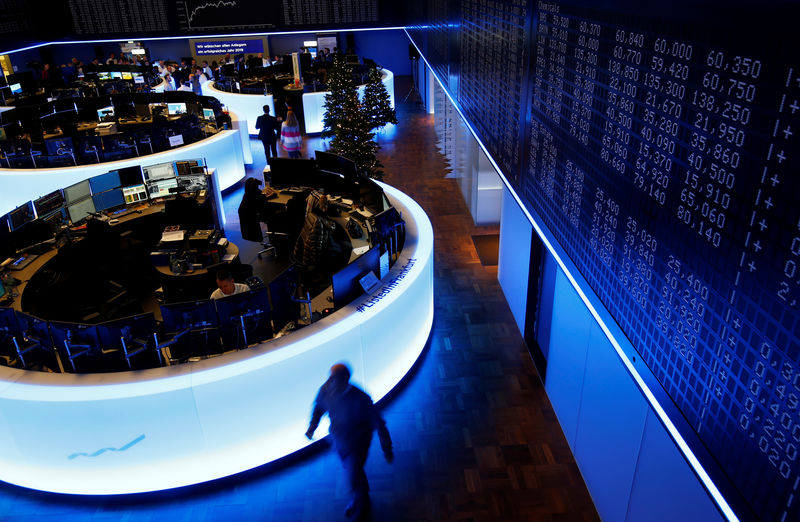By Geoffrey Smith
Investing.com -- What could be worse for the stock market’s spirits than the resumption of a trade war and the crippling of Europe’s crisis response? While neither is real yet, the coming week will show how present the risk is.
On Sunday, President Donald Trump and Secretary of State Mike Pompeo both launched attacks against China for its perceived role in unleashing the pandemic, Trump in particular highlighting the possibility and desirability of punishing it, not least through the imposition of new tariffs.
By 5:30 AM ET (0930 GMT), the benchmark Stoxx 600 was down 3.6% at 327.86, its lowest in over a week, making April’s rebound look more than ever like a bear-market rally. The German Dax, Europe’s best performer in April, was down 3.7%, while the FTSE 100 was the outperformer, falling only 0.5% thanks to some strong performances by virus-beating stocks such as Rentokil (LON:RTO) (office cleaning) and Reckitt Benckiser (LON:RB) (disinfectants) and to the stabilization of index heavyweights Royal Dutch Shell (LON:RDSa) and BP (NYSE:BP) after last week’s bloodbath.
There is evidence to suggest that the coordinated media blitz is an exercise in diverting attention rather than an earnest threat: the Trump administration has temporarily waived tariffs on a large range of Chinese imports since the crisis began, afraid of burdening U.S. consumers with higher prices as tens of millions lose their jobs or suffer cuts to their income.
“If President Trump’s attempts to get re-elected continue to rely on attacking China, investors will worry about whether this will bring additional costs to specific U.S. firms,” UBS Wealth Management chief economist Paul Donovan said in a morning note.
Pompeo, meanwhile, told ABC at the weekend that there was “significant evidence” that the Covid-19 virus originated in a laboratory in Wuhan, without actually presenting any of that evidence – an approach that worked for his predecessor Colin Powell in rallying public opinion before the invasion of Iraq 17 years ago, but which may be difficult to repeat, given how that turned out.
While U.S.-China tensions have kept their ability to terrorize global markets, the more immediate threat to European markets is a more local one. On Tuesday, Germany’s Constitutional Court is set to give its final ruling on the legality of the European Central Bank’s asset purchase programs.
A couple of months ago, this looked likely to be waved through with little more than the usual grumbling from a court which has already backed away twice from challenging the ECB head-on.
However, the ECB last month cast aside all the restraints on its bond-buying that it had previously adopted to placate its German critics. That raises the risk of the judges handing down a ruling that could stop the German central bank from participating in QE, damaging the credibility of a policy that is the centerpiece of the euro zone’s crisis response.
This being the euro zone, the likeliest outcome is still a fudge that puts off answering the hard question – how willing are Germany and the rest of northern Europe to accept liability for their brethren in the weaker periphery of the euro zone.
Even so, it’s more than enough to keep markets on the defensive after a month-long rally that has found little justification so far in companies’ quarterly reports: data from Refinitive suggest that first-quarter earnings will be down 25% on the year for Stoxx 600 companies. The second quarter, of course, is likely to be much worse.
